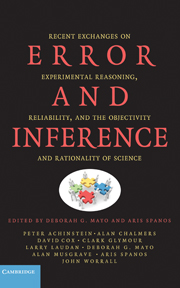 Error and Inference
Error and Inference Book contents
- Frontmatter
- Contents
- List of Contributors
- Preface
- Introduction and Background
- 1 Learning from Error, Severe Testing, and the Growth of Theoretical Knowledge
- 2 The Life of Theory in the New Experimentalism
- 3 Revisiting Critical Rationalism
- 4 Theory Confirmation and Novel Evidence
- 5 Induction and Severe Testing
- 6 Theory Testing in Economics and the Error-Statistical Perspective
- 7 New Perspectives on (Some Old) Problems of Frequentist Statistics
- 8 Causal Modeling, Explanation and Severe Testing
- 9 Error and Legal Epistemology
- Index
- References
Introduction and Background
Published online by Cambridge University Press: 29 January 2010
- Frontmatter
- Contents
- List of Contributors
- Preface
- Introduction and Background
- 1 Learning from Error, Severe Testing, and the Growth of Theoretical Knowledge
- 2 The Life of Theory in the New Experimentalism
- 3 Revisiting Critical Rationalism
- 4 Theory Confirmation and Novel Evidence
- 5 Induction and Severe Testing
- 6 Theory Testing in Economics and the Error-Statistical Perspective
- 7 New Perspectives on (Some Old) Problems of Frequentist Statistics
- 8 Causal Modeling, Explanation and Severe Testing
- 9 Error and Legal Epistemology
- Index
- References
Summary
Philosophy of Science: Problems and Prospects
Methodological discussions in science have become increasingly common since the 1990s, particularly in fields such as economics, ecology, psychology, epidemiology, and several interdisciplinary domains – indeed in areas most faced with limited data, error, and noise. Contributors to collections on research methods, at least at some point, try to ponder, grapple with, or reflect on general issues of knowledge, inductive inference, or method. To varying degrees, such work may allude to philosophies of theory testing and theory change and philosophies of confirmation and testing (e.g., Popper, Carnap, Kuhn, Lakatos, Mill, Peirce, Fisher, Neyman-Pearson, and Bayesian statistics). However, the different philosophical “schools” tend to be regarded as static systems whose connections to the day-to-day questions about how to obtain reliable knowledge are largely metaphorical. Scientists might “sign up for” some thesis of Popper or Mill or Lakatos or others, but none of these classic philosophical approaches – at least as they are typically presented – provides an appropriate framework to address the numerous questions about the legitimacy of an approach or method.
Methodological discussions in science have also become increasingly sophisticated; and the more sophisticated they have become, the more they have encountered the problems of and challenges to traditional philosophical positions. The unintended consequence is that the influence of philosophy of science on methodological practice has been largely negative.
- Type
- Chapter
- Information
- Error and InferenceRecent Exchanges on Experimental Reasoning, Reliability, and the Objectivity and Rationality of Science, pp. 1 - 27Publisher: Cambridge University PressPrint publication year: 2009
References
- 1
- Cited by


